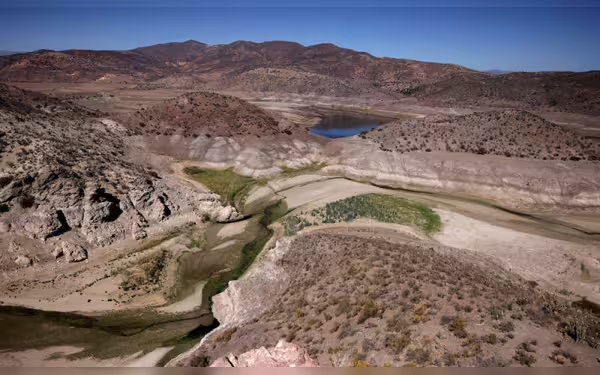Monday, December 30, 2024 05:43 PM
UN Urges $2.6 Trillion Investment to Combat Land Degradation
- UN calls for urgent $2.6 trillion investment.
- Private sector must contribute significantly to land restoration.
- 15 million square kilometers of land currently degraded.
 Image Credits: brecorder
Image Credits: brecorderThe UN calls for a $2.6 trillion investment to reverse land degradation, emphasizing the need for private sector involvement.
The United Nations has recently highlighted a pressing global issue: land degradation. This phenomenon, which refers to the deterioration of the earth's land resources, poses a significant threat to food security and environmental stability. As the world grapples with the challenges of climate change and a rapidly growing population, the UN has called for a staggering investment of $2.6 trillion by the end of the decade to reverse this trend. This is the first time such a specific financial figure has been put forward, underscoring the urgency of the situation.
According to Ibrahim Thiaw, the Executive Secretary of the United Nations Convention to Combat Desertification (UNCCD), the need for action is more critical than ever. He pointed out that the combination of more frequent and severe droughts, driven by climate change, and the increasing food demands of a rising global population, places societies at a heightened risk of instability. The ongoing discussions in Riyadh aim to enhance the world’s resilience to drought, strengthen legal obligations for states, and secure necessary funding.
Thiaw emphasized that a significant portion of the required investment—approximately $1 billion a day—must come from the private sector. Currently, public funds dominate land restoration efforts, which he argues is not sustainable. "The bulk of the investments on land restoration in the world is coming from public money. And that is not right," he stated. He further noted that the private sector, which is primarily responsible for food production—the main driver of land degradation—contributes only 6% of the funds needed for rehabilitation.
With the global population expected to double food production on the same amount of land, the role of private investment becomes even more crucial. The discussions in Saudi Arabia are part of a broader series of UN events focusing on biodiversity and climate change, where financial resources—or the lack thereof—have been a central theme.
To meet the ambitious target of $2.6 trillion, the world must close an annual funding gap of $278 billion. In 2022, only $66 billion was invested in land restoration, highlighting the significant shortfall. A recent UN-backed study warned that land degradation is "undermining Earth’s capacity to sustain humanity," and failure to address this issue could create challenges for future generations.
Currently, around 15 million square kilometers of land—an area larger than Antarctica—are degraded, with this figure increasing by approximately 1 million square kilometers each year. Thiaw acknowledged that reaching agreements on legal obligations for states will be challenging, as some countries are hesitant to adopt legally binding commitments. However, he stressed the importance of setting more ambitious targets, such as protecting 1.5 billion hectares of land.
Ultimately, the failure to restore degraded land could hinder global efforts to combat climate change and protect biodiversity. Agriculture is a significant contributor to greenhouse gas emissions, deforestation, and freshwater use, accounting for 23%, 80%, and 70%, respectively. Thiaw concluded by stating, "The resources that we are talking about are not charity. So it is important that we see this not as an investment for poor Africans, but as an investment that will keep the world balanced." This perspective highlights the interconnectedness of environmental health and global stability, reminding us that investing in our planet is an investment in our future.












